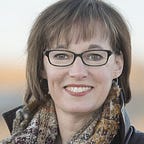As the curtain comes down on the drama that was 2021, this is the perfect moment to reflect on how I showed up for others this past year and what I want my personal leadership efforts to look like in 2022.
I am among a growing number of people who believe that the most valuable asset in life is agency, the sense that I have a say in what happens to me and to what happens around me. As a Master’s student and Principal of my own private sustainability planning consulting practice, I feel a significant amount of personal agency to be intentional, reflective, present and in command of what happens to me. What is happening around me in this VUCA world, however, often feels well outside that command. It is extremely obvious that a ‘me against the ills of the world’-approach will not (if ever!) suffice. I cannot do this alone.
I hold a concept of ‘me’ (that might fight for global improvement) that is deeply rooted in my social identity. I recognize I am a person born into significant privilege. My basic life needs are fully met. The Sustainable Development Goals (SDGs) are applicable to me as a responsibility moreso than as a condition for my future survival. While those of whom I wrote of in my earlier blog on social inequality need the SDGs to be realised as a global equalizing force, I will also benefit. My future economic prosperity will be less at risk. My mental and physical vitality will be less threatened as the natural world and environment in which I live is given a greater chance for its own flourishing; and in turn, the flourishing of my children and future generations of my privileged family. From this winning position, it is tempting (but still scary) to step out boldly to challenge the status quo.
So how might I apply my agency in the world around me effectively (and with fortitude)? In my last blog I claimed greater readiness to step into the centre of important sustainability issues. Through the University of Cambridge Institute of Sustainability Leadership, I continue to access new theory, practice and insights on what is at the heart of impactful leadership. Knowing what to do and having the confidence in one’s abilities to actually do it are two very different things, however. For my own part, I gain confidence by holding to the belief that leadership itself is a practice and not a title or an outcome.
To understand how to practice leadership, I like the approach some designers are taking to system-wide and wicked problems — they are looking to nature for solutions and have formed a school of thought known as Regenerative Design and Biomimicry. Nature’s leadership lessons are bountiful. While there is much I can (and will!) write about from these lessons, I wish to start with the concept that ‘Everything in nature contributes to the life of others, even in death.’
The wolf is a favourite species for the study of nature for leadership lessons. Typical instructions about teamwork, communication, respect and perseverance are espoused in a number of examples you might find across the internet. My favourite insights relate to the ‘pack-orientation’ and behaviour of the leaders (aka ‘alphas’). In their 2018 book, The Wisdom of Wolves, Lessons from the Sawtooth Pack, Jim and Jamie Dutcher look more deeply into ‘pack-orientation’ and describe this social phenomenon:
Wolves are complex, highly intelligent animals who are caring, playful, and above all devoted to family. Only a select few other species exhibit these traits so clearly. Just like elephants, gorillas and dolphins, wolves educate their young, take care of their injured and live in family groups.
The ‘alphas’ take on responsibility for the vitality and cohesiveness of the pack. Their leadership is often practiced in a manner that aligns to servant leadership theory where the highest-priority needs of others dictate focus (for strategy and action). Behaviours include scouting the path forward, leading from the back to watch the whole pack and sharing knowledge across generations.
Since my last blog, the way I have stepped into the centre of important sustainability issues is by focusing on sharing knowledge across generations. I took on a role as part-time Professional Associate at the University of Saskatchewan, leading the Professional Planning Practice course that is a requirement for all Regional and Urban Planning students before graduation. This has been a tremendously rewarding experience, one that inspires much hope in me as I meet so many twenty-somethings ready to claim agency and hungry to learn how and where to best apply it.
As a Certified Public Participation Professional I view all my work through the lens of empowering others so they may take agency in decisions that matter to them. My decision to seek this professional certification, along with my decision to take on the teaching role at the UofS are rooted in my own penchant for servant leadership. My personal theory is that through such leadership I can build my own ‘pack’ of agents willing to challenge the status quo.
I am grateful for the examples set by the amazing scholars and leaders identified in my last blog. The work these people are doing is inspiring and I am pleased to take lessons from them, share with my students and consulting clients, and to develop my own strategies and actions based on their guidance and insights. In the spirit of ‘pack-orientation’ I will also work to hone my skills at taking guidance from my own ‘pack’ (my students and clients) to help nurture vitality and cohesion for greater positive impact on the challenges of our day.
What, then, is my 2022 personal leadership goal? To coach in the spirit of an alpha wolf… and help achieve Ashoka where everyone in the world sees themselves as a changemaker with agency!
Perhaps you will join this ‘pack’? What is your 2022 goal?
